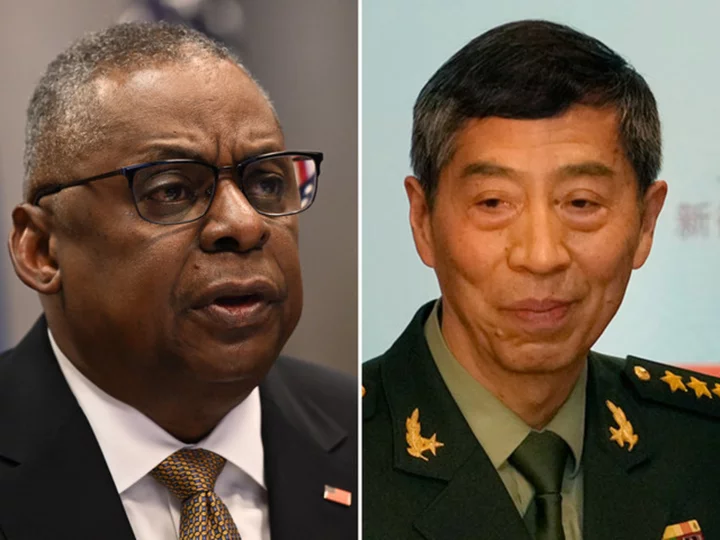US Secretary of Defense Lloyd Austin "spoke briefly" with his Chinese counterpart in Singapore on Friday, a Pentagon spokesperson said Friday.
"Secretary Austin and PRC Minister of National Defense Li Shangfu spoke briefly at tonight's opening dinner of the Shangri-La Dialogue in Singapore. The two leaders shook hands, but did not have a substantive exchange," Pentagon Press Secretary Brig. Gen. Pat Ryder said in a statement.
"The Department believes in maintaining open lines of military-to-military communication with the PRC — and will continue to seek meaningful military-to-military discussions at multiple levels to responsibly manage the relationship," the statement said.
The brief encounter follows China rejecting a US proposal for Austin to hold a formal meeting with his counterpart at the Shangri-La Dialogue Security Forum that is now underway in Singapore. Austin had not spoken with his counterpart in months despite other requests. Earlier this year, China refused to take a call after the US shot down a suspected Chinese surveillance balloon that had traversed across the country.
China's Defense Ministry blamed the US in a statement this week about the deteriorating communication, saying that responsibilities "for the current difficulties faced by the two militaries in their exchanges lies entirely with the US side."
"The US claims that it wants to strengthen communication, but in reality it disregards China's concerns and creates artificial obstacles, seriously undermining mutual trust between the two militaries," said ministry spokesperson Tan Kefei.
The break in communication has extended past the most senior levels of the two countries' militaries. Adm. John Aquilino, commander of the US Indo-Pacific Command, told lawmakers in April that Chinese officials have also declined to accept a standing invitation to meet with the eastern and southern theater commanders of the People's Liberation Army.
Asked in Japan on Thursday about China's turning down the meeting request, Austin warned that the ongoing lack of communication could result an "incident that could very, very quickly spiral out of control."
"[Y]ou've heard me talk a number of times about the importance of countries, with large, with significant capabilities, being able to talk to each other so you can manage crises and prevent things from spiraling out of control unnecessarily," Austin said during a news conference with Japanese Minister of Defense Yasukazu Hamada.
"And as we take a look at some of the things that China is doing in the international airspace in the region and international waterways, you know, the provocative intercepts of our aircraft and also our allies' aircraft, that's very concerning, and we would hope that they would alter their actions. But since they haven't yet, I'm concerned about, at some point, having an incident that could very, very quickly spiral out of control."









